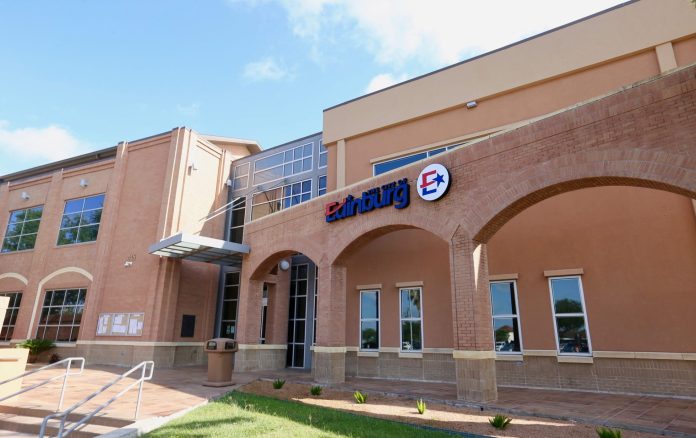
|
Only have a minute? Listen instead
Getting your Trinity Audio player ready...
|
EDINBURG — The city council here has approved a series of rate increases that will see the average resident paying 67% more on their water and sewer bills within five years.
The increases will come in stages, with the first rate hike expected to go into effect on March 1, followed by a second increase at the start of the new fiscal year this October. Three additional rate increases will be implemented every Oct. 1 through 2027.
However, the vote wasn’t unanimous. Edinburg Mayor Ramiro Garza Jr. and Place 1 Councilman Dan Diaz voted against the measure during Tuesday night’s city council meeting.
Afterward, Garza explained he’s not opposed to increasing rates, but he wished the council had considered his recommendation to hold public hearings before passing the measure.
“We just adopted a budget in October where we told the public we were not going to adjust rates,” Garza said during a lengthy discussion.
The mayor proposed holding a series of public hearings to gather public input about the rate adjustments.
“Over three months ago, we told everybody, ‘Your rates are going to stay the same for the whole year,’ right?” Garza said, referring to discussions the council held last fall when deciding on the 2024 fiscal budget.
“We should have told everybody, ‘Well, there’s a study we’re doing, we may adjust rates.’ But we didn’t do that,” Garza added.
However, just before discussing the rate increases amongst themselves Tuesday, the council shot down the mayor’s idea.
RISING RATES
The new rates will be implemented over the next five years in increases of about 11% per adjustment.
Willdan Financial Services, the consultants the city hired last summer to carry out the rate study, illustrated what those sequential increases will look like for the average ratepayer.
In Edinburg, an average residential consumer uses between 5,000 and 7,000 gallons of water and wastewater per month, according to Dan V. Jackson, a vice president with Willdan.
Jackson showed the council a rubric for what that customer will pay over the next five years for 5,000 gallons of usage per month.
Beginning March 1, that consumer will see their bill go up about $2.97 per month. On Oct. 1, it will go up another 9%, or an additional $3.28 per month.
The rate won’t go up again until the start of the next fiscal year, on Oct. 1, 2025.
At that point, residents will see their bills go up an additional 11% every October through 2027. That equates to about $3.64 per month in 2025, $4.04 per month in 2026 and $4.49 per month in 2027.
All told, the average 5,000-gallon-per-month residential customer will pay about $18.13 more per month on their water and sewer bills by late 2027.
That’s an increase of just over 67% from today’s rate of $26.87 to $45.28 per month.
Those figures are for water and sewer service charges only and do not include additional charges for trash service, taxes and other fees that make up the city’s unified utility bills.
Commercial customers will see similar increases.
The average commercial consumer pays about $223.73 for 50,000 gallons of water per month.
On March 1, that rate will go up to $248.34, and then go up again to $275.66 on Oct. 1 of this year.
By 2027, the average commercial customer will be paying $377 for water and wastewater service, for a total increase of 68.5% compared to today.
NECESSARY DECISION
None of the councilmembers seemed particularly enthusiastic about the prospect of charging residents — and themselves — more for water and sewer service. However, all of them conceded that the rate changes were necessary to meet current and future needs.
“No one on the council wants to raise rates, but if we’re being responsible, we have to look at our growth,” Diaz said. “What we’re charging, we’re barely meeting the requirements.”
As Jackson, the consultant, explained to the council during a Dec. 19 workshop, the revenues generated by the rate increases will go toward financing dozens of utility infrastructure projects over the coming decade, including new water and wastewater treatment plants.
Combined, the 87 projects come with an estimated $260 million price tag.
The rate adjustments are necessary for another reason, too — to bring the utility department back into a state of self-sufficiency.
Currently, one large-scale utility infrastructure project that is on the books is being subsidized via the city’s general fund, which is typically used to pay for day-to-day operating expenses, such as payroll.
The project involves moving utility lines north of the city as TxDOT works to expand Interstate Highway 69-C. Edinburg is paying for it by loaning itself the money via a capital improvement plan loan.
“Unfortunately, right now, because of some of the transactions that have occurred, we’ve had to work with other resources and it’s not self-sustaining at this point,” Edinburg Finance Director Ascencion Alonzo said of the city’s utility fund.
“It’s an enterprise fund. At minimum, it should break even,” he added, referring to how the money that consumers pay for water and sewer service should ideally generate enough revenue to pay the utility department’s operations and expenditures.
Place 4 Councilman David White placed part of the blame for the insolvent fund, as well as some long-delayed infrastructure projects, at the feet of the previous city council.
“There was a lot of stuff that I discussed and all this stuff that I found out later, and thank God for all you guys coming in that we’re starting to clean up some freakin’ messes that were done, and this is one of them,” White said.
He further lamented the blowback he expects the council will receive in the wake of the rate hikes.
“We’re gonna take a bath with our public because we’re gonna have to raise this rate,” he said.



